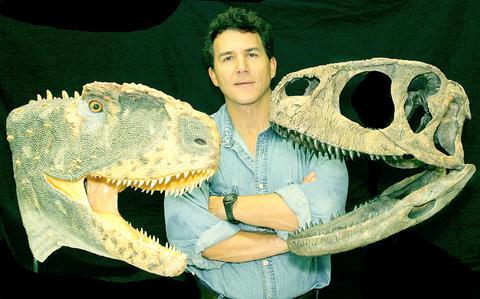The fossil skull of a peculiar, wrinkle-faced dinosaur unearthed four years ago in the Sahara is providing new evidence that Africa split from the other southern continents more recently than previously thought, scientists say.
"It was sort of a missing puzzle piece that serves to banish the notion that Africa was isolated earlier," said Paul Sereno, a University of Chicago paleontologist who led the dinosaur-hunting expedition to a remote, desert region of Niger in 2000.
"It really completes the story very convincingly," he said.

PHOTO: AP
The skull, found amid a wealth of dinosaur bones from the late cretaceous period, came from a dinosaur Sereno named Rugops primus, or "first wrinkle face." The meat-eater, believed to be about 9m long and 95 million years old, belonged to a group of southern dinosaurs called abelisaurids.
Before the discoveries, abelisaurids from that period had been found in South America, Madagascar and India, but none had been confirmed on Africa, supporting a theory that Africa split off first from the southern super-continent of Gondwana 120 million or more years ago.
The new fossil, however, and its close relation to a South American abelisaurid, indicate Africa was still connected to the other southern land masses, at least by land bridge, 100 million years ago, Sereno and his co-authors said.
Sereno and his team were nearing the end of their expedition when they focused on a football-sized area in a remote region of the Sahara. In a span of 10 days, he said, they dug up more dinosaurs of the early part of the Late Cretaceous period than the total of what had been found in Africa before.
"It was like the valley of the kings, except the kings were dinosaurs," Sereno said. He said the team also found previously unknown species of crocodiles and a yet-to-be-named dinosaur that was about 18m long.
"Sometimes you run into the pot of gold. That expedition I think was per pound of discovery the greatest expedition I ever took students on," he said.
Sereno, University of Chicago colleague Jack Conrad and Jeffrey Wilson of the University of Michigan published news of the finding, along with the discovery of another new species of dinosaur, in the edition of Proceedings of the Royal Society of London to be released on Wednesday.
Sereno said Rugops probably was a scavenger that used its long snout to pick at carrion. One odd feature of the dinosaur, he said, was two rows of seven holes along its snout.
"It's the most peculiar thing. We don't know what was growing out of there," Sereno said.
He said it was probably something ornamental, like a fleshy crest.

POLITICAL PRISONERS VS DEPORTEES: Venezuela’s prosecutor’s office slammed the call by El Salvador’s leader, accusing him of crimes against humanity Salvadoran President Nayib Bukele on Sunday proposed carrying out a prisoner swap with Venezuela, suggesting he would exchange Venezuelan deportees from the US his government has kept imprisoned for what he called “political prisoners” in Venezuela. In a post on X, directed at Venezuelan President Nicolas Maduro, Bukele listed off a number of family members of high-level opposition figures in Venezuela, journalists and activists detained during the South American government’s electoral crackdown last year. “The only reason they are imprisoned is for having opposed you and your electoral fraud,” he wrote to Maduro. “However, I want to propose a humanitarian agreement that

Young women standing idly around a park in Tokyo’s west suggest that a giant statue of Godzilla is not the only attraction for a record number of foreign tourists. Their faces lit by the cold glow of their phones, the women lining Okubo Park are evidence that sex tourism has developed as a dark flipside to the bustling Kabukicho nightlife district. Increasing numbers of foreign men are flocking to the area after seeing videos on social media. One of the women said that the area near Kabukicho, where Godzilla rumbles and belches smoke atop a cinema, has become a “real

‘POINT OF NO RETURN’: The Caribbean nation needs increased international funding and support for a multinational force to help police tackle expanding gang violence The top UN official in Haiti on Monday sounded an alarm to the UN Security Council that escalating gang violence is liable to lead the Caribbean nation to “a point of no return.” Special Representative of the UN Secretary-General for Haiti Maria Isabel Salvador said that “Haiti could face total chaos” without increased funding and support for the operation of the Kenya-led multinational force helping Haiti’s police to tackle the gangs’ expanding violence into areas beyond the capital, Port-Au-Prince. Most recently, gangs seized the city of Mirebalais in central Haiti, and during the attack more than 500 prisoners were freed, she said.

DEMONSTRATIONS: A protester said although she would normally sit back and wait for the next election, she cannot do it this time, adding that ‘we’ve lost too much already’ Thousands of protesters rallied on Saturday in New York, Washington and other cities across the US for a second major round of demonstrations against US President Donald Trump and his hard-line policies. In New York, people gathered outside the city’s main library carrying signs targeting the US president with slogans such as: “No Kings in America” and “Resist Tyranny.” Many took aim at Trump’s deportations of undocumented migrants, chanting: “No ICE [Immigration and Customs Enforcement], no fear, immigrants are welcome here.” In Washington, protesters voiced concern that Trump was threatening long-respected constitutional norms, including the right to due process. The